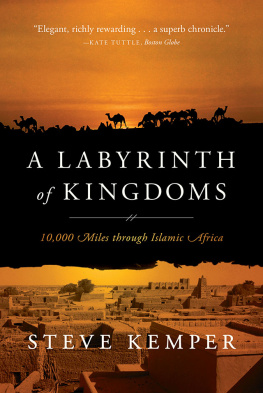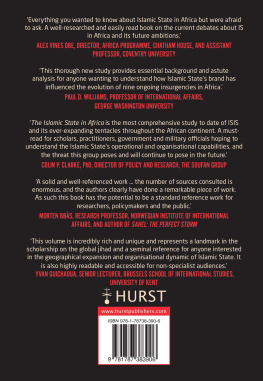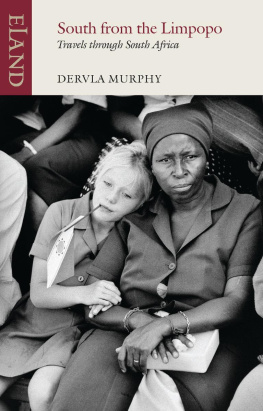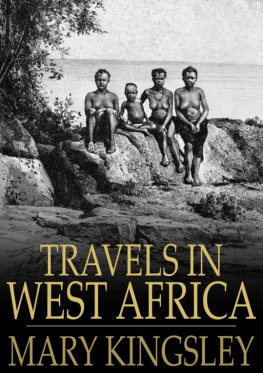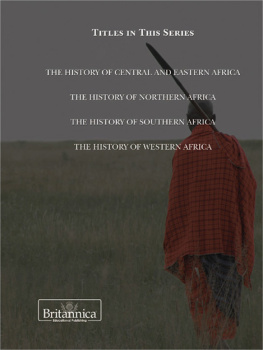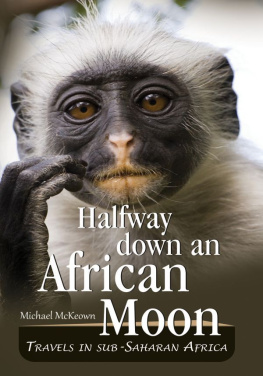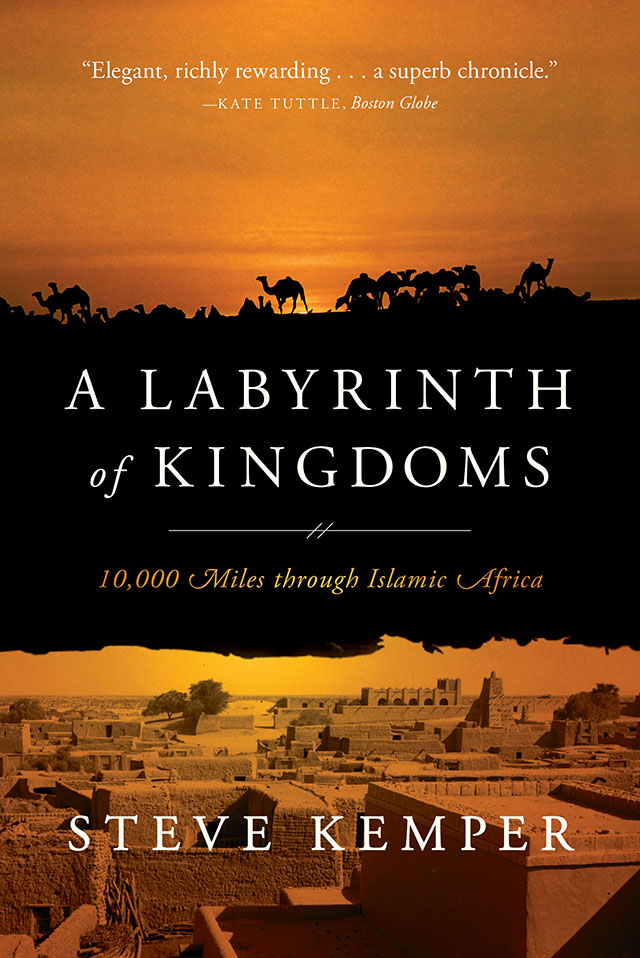
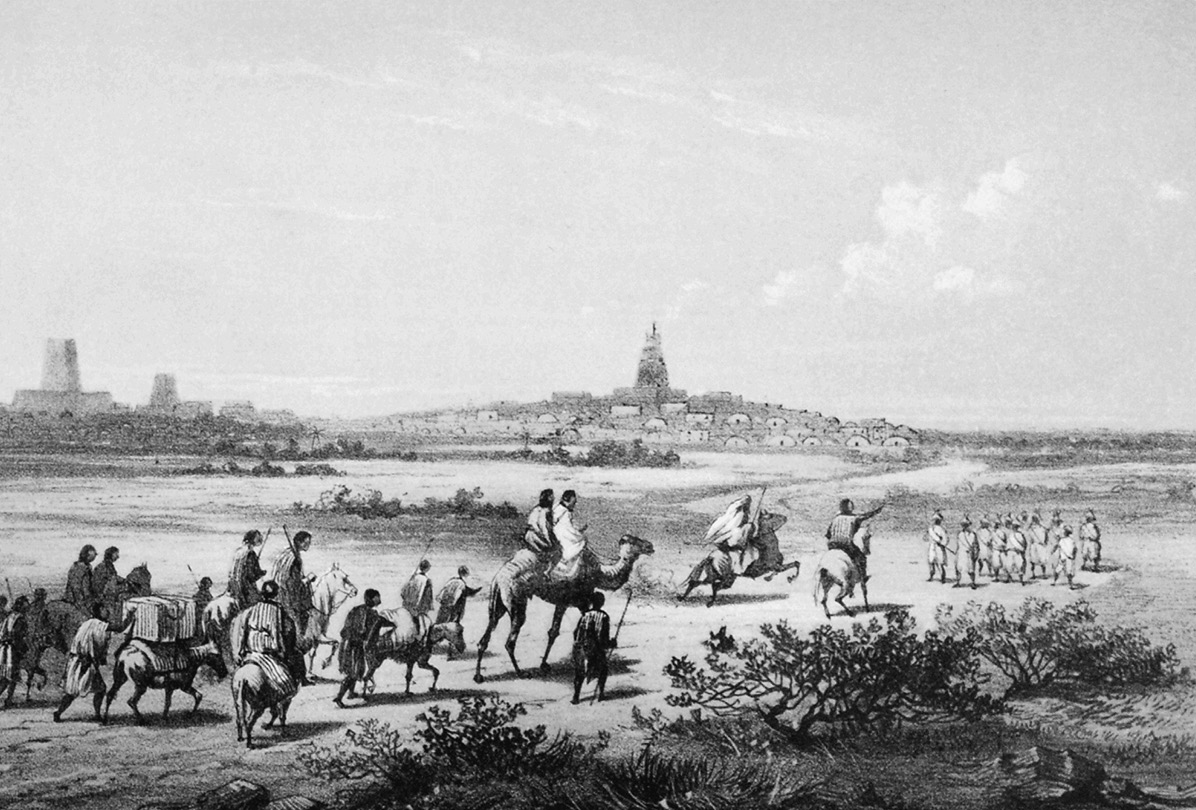
A
Labyrinth
of
Kingdoms

10,000 Miles
through
Islamic Africa
STEVE KEMPER
W. W. NORTON & COMPANY | New York London
For Ben and Alex, heading out
Contents
Prologue
T HE YOUNG SCIENTIST KNEW HE WOULD SOON DIE OF THIRST. LAST night, far across the desert plain, he had seen bonfires built by his companions to guide him back to the caravan. But he was too weak and feverish to move, with no strength to gather wood for an answering fire. He shot his pistol twice, but the Saharan night absorbed the sound. No reply came.
Behind him rose the peak called the Palace of the Demons. His Tuareg guides had warned him not to antagonize the powerful desert spirits by trespassing on their sacred mountain. He scoffed at their superstitions. He was a scientist, trained by the greatest scholars in Europe, and he was fit and strong. He suspected that this verboten home of demons might be some ancient place of worship where he might find inscriptions or carvings that added to the worlds store of knowledge. Nothing could keep him from exploring such a place. At any cost, he said, a phrase he didnt yet fully understand. The expeditions leader asked him not to go alone. The young scientist shrugged him off as overcautious, but persuaded a younger colleague to come along. He agreed to meet the expedition at the next well, as he often did, impatient with the caravans slow pace.
Now his self-confidence looked like fatal arrogance. First he underestimated the distance to the mountain. He also hadnt expected the extensive plain of black pebbles, so tiring to traverse, and scorching from the radiant heat. Nor had he foreseen the deep ravine that protected the mountain like a moat, adding more distance. His companion, exhausted, had turned back there, but he refused to retreat.
When he finally reached the mountaintop, he found nothing but wild jumbled boulders, as if titans had been at war. He began the descent. By noon he was out of water. His exertions under the summer Saharan sun drained him. He kept moving, though he now had no idea where the caravan was, or his position in relationship to it. In midafternoon he saw some huts and hobbled toward them, desperate for water. They were abandoned. He dragged himself beneath a slender leafless tree that stood alone on the arid plain. He watched for rescuers. Near sunset a string of camels in the distance sparked some hope, but it dissolved, a mirage.
Fever kept him from sleeping that night. Dawn cheered him until he realized that this days sun would finish him. He changed position as it rose, crawling after the shadow cast by the trees slim trunk. As he began dying, his body pulled moisture from wherever it could find any, to keep his heart pumping. His joints stiffened, his lips cracked, his tongue swelled from lack of saliva. Around noon, when there was only enough shade for his head, thirst drove him mad. He cut his arm and sucked blood from the wound. The effort threw him into delirium.
As the sun set, he flickered in and out of consciousness, his mind drifting. His dreams and ambitions had burned to cinders on this flat wasteland. He would not make spectacular scholarly discoveries that changed Europes perception of Africa. He would not visit the ancient kingdom of Bornu on Lake Chad or the Fulani empire of Sokoto. He would not explore the mysteries of Timbuktu. His contract with the British Foreign Office would die with him. Instead of fame, his reward would be a footnote in the history of African exploration, another futile death among so many others. He would not end his days among the scholars of Europe, but here, a husk in the shadow of a gaunt tree. He commended himself to God and closed his eyes.
After a time, from a distance, he heard the bawl of a camel. It was the most delightful music I ever heard in my life, he later wrote. Like Lazarus, he had been given a second chance, and he promised himself to make the most of it.
H IS NAME was Heinrich Barth. In 1849 he joined a small British expedition to Islamic North and Central Africa. His five-and-a-half-year, 10,000-mile adventure ranks among the greatest journeys in the annals of exploration. His feats rival, if not surpass, those of the most famous names in nineteenth-century African travel: Park, Burton, Speke, Livingstone, Stanley, Baker, Cameron. In terms of knowledge collected and ongoing relevance, none of these famous men compare with Barth, whose discoveries and written work are considered indispensable by modern historians, geographers, linguists, and ethnographers.
Yet because of shifting politics, European preconceptions about Africa, and his own thorny personality, Barth has been almost forgotten. The general public has never heard of him or his epic journey or his still-pertinent observations about Africa and Islam. His monumental five-volume Travels and Discoveries in North and Central Africa , written first in English, is rare even in libraries. Though he made his journey for the British government, he has never had a biography in English. Barth fell through a crack in history.
This is a forgotten story of survival, adventure, and scientific discovery by a remarkable man.
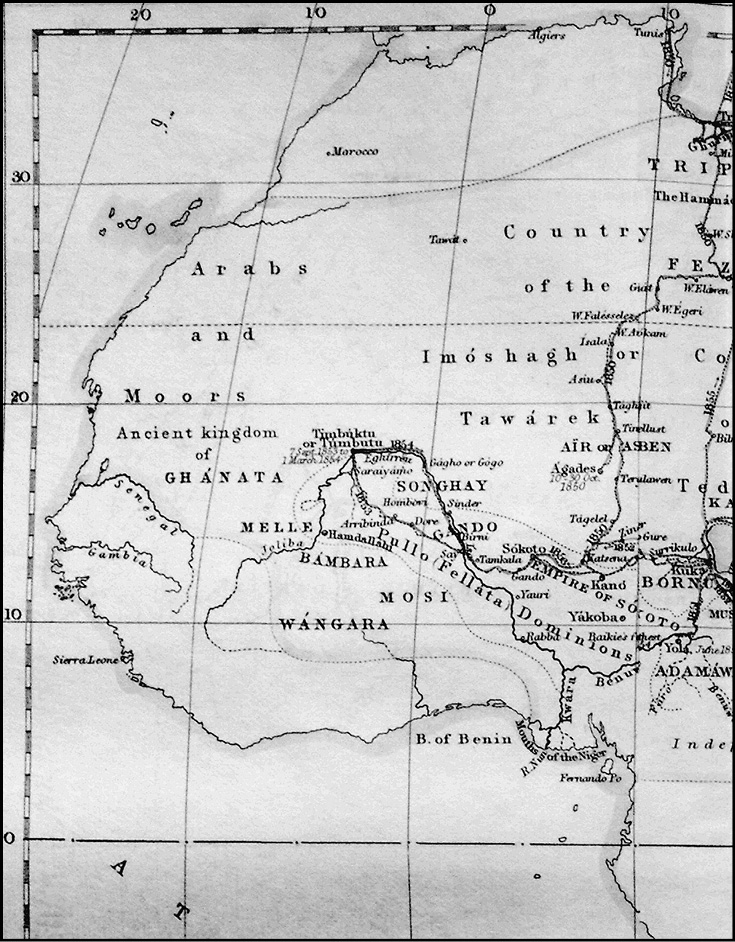
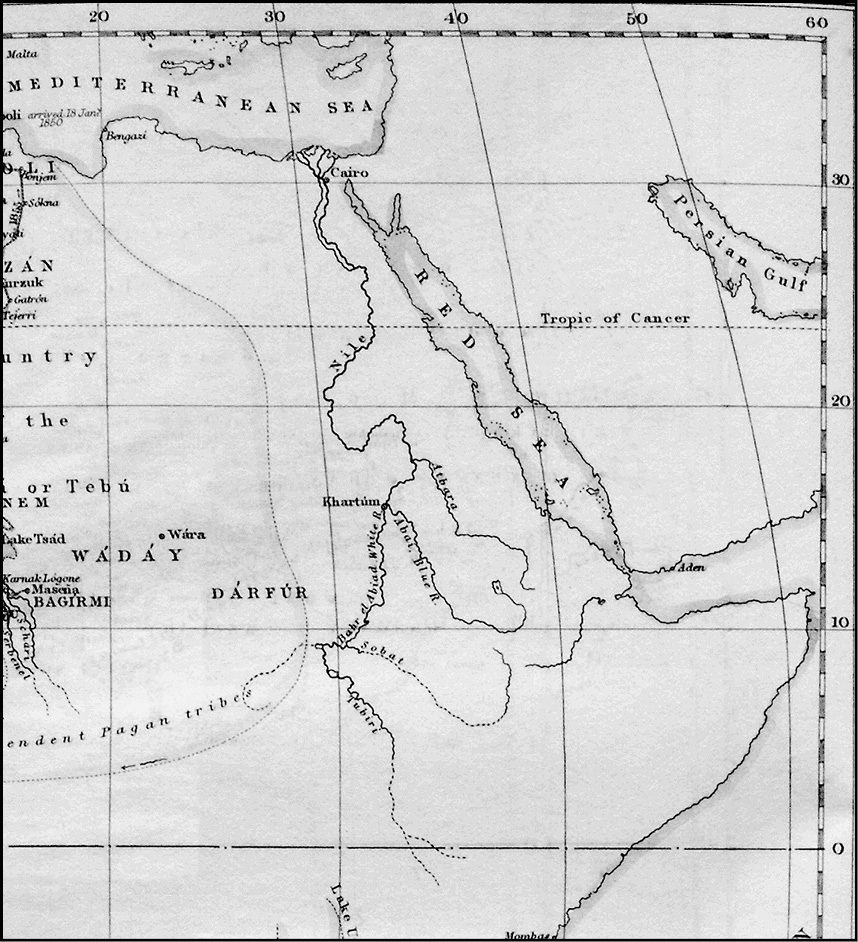
Map of the Expeditions Routes, 185055
(from Travels and Discoveries , drawn by August Petermann)

Preparations
T HE AUGURIES FOR A FRICAN EXPLORATION MUST HAVE BEEN STRONG in 1821. Both Richard Burton and Samuel Baker, famous for their discoveries in East Africa, were born that year, and the British explorers Walter Oudney, Hugh Clapperton, and Dixon Denham left for their pioneering journey to Lake Chad and the kingdom of Bornu. Heinrich Barth, the next European to see Bornu, was born February 16, 1821 in Hamburg, Germany.
He was the third of four children born to Johann and Charlotte Barth. Johann came from austere beginnings. His parents, Thuringian peasants, both died when he was a boy. This calamity had a silver lining, since the orphan was taken in by a relative in Hamburg, a cosmopolitan port in northern Germany. The city offered ample opportunities to the sharp and energetic. At first Johann worked as a butcher, but he soon found his way into Hamburgs mercantile class, and married into a respectable Hamburg family. By the time Heinrich was born, Johann was a trader doing thriving business with Hanseatic cities along the coast of northern Europe. He and Charlotte were strict Lutherans, and they raised their children according to exacting notions of morality, duty, industry, and discipline.
Though uneducated, Johann respected learning and gave his children the best possible schooling. In Hamburg that meant the Johanneum, the citys oldest and most rigorous academy, founded in 1529. Barth was accepted in 1832 at age eleven. From his first days there he was a misfit. He was already exhibiting many of his marked characteristics: a gift for art and languages, severe self-discipline, omnivorous intellectual energy, and a devotion to scholarship that sometimes looked like conceit. All these set him far apart from his classmates, socially as well as academically.
Next page
